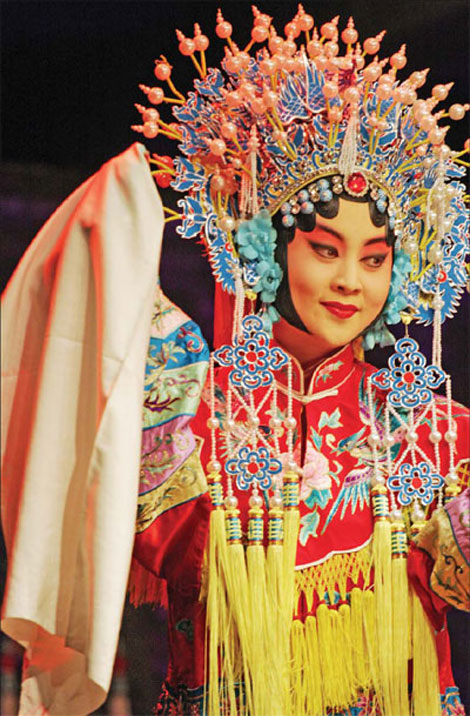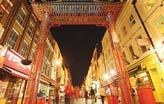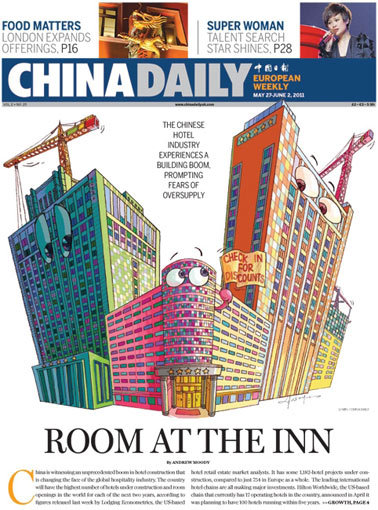The song dynasty
Updated: 2011-05-13 10:51
By Liu Lu (China Daily European Weekly)
 |
|
Peking Opera is perhaps the most well-known Chinese opera. Provided to China Daily |
There are MORE THAN 300 types of Chinese operas but two POPULAR varieties are major standouts
The Mandarin word for opera is xiqu, which in English means "theater of song". but this translation does not fully capture the essence of this beloved cultural icon. To the Chinese people, the opera is more than just a musical. It is an experience that fuses folk songs, dances, poetry recitals, acrobatics, martial arts and distinctive dialectical music. It is one of the world's oldest continuously practiced performing arts that also never stops evolving.
Over the past 800 years, Chinese opera has developed into some 300 dazzling regional varieties and each are distinguished by differences in musical form and staging conventions.
However, there are common factors. All operas are performed with musical accompaniment played on a wide range of traditional Chinese instruments, such as erhu and lute.
The loud clacking sound of clappers, the banging noise of drums and the ringing gong of cymbals may come across as strange to newcomers, but these are just a few of the elements, which make a performance special.
Colorful costumes, exaggerated make-up, the performers' profound facial expressions and beautifully written dialogue of high literary value, all combine to tell a story.
Today, Chinese operas are keeping up with the times and continue to reach out to audiences from all walks of life.
Artists have taken modern theatrical practices and incorporated them into traditional performing methods to win a new generation of fans.
"Through adaptation of traditional Chinese opera scripts and increase in the usage of modern music elements, Chinese opera has attracted more young people and also overseas fans who now appreciate its unique charm," says Liu Wenfeng, a professor with the Chinese National Academy of Arts and president of China Opera Society.
"Some foreigners are now even learning it as this traditional art makes a great leap forward to become more globalized."
"Chinese opera masters are applying scientific phonic methods from Western opera and using diversified kinds of music.
"By borrowing ideas from Western opera composition concepts, the producers are proving the two art forms can become increasingly complementary to each other."
What delights Liu the most is that more young people are becoming fascinated by Chinese opera, and this paints an optimistic future for its future development.
Although there are hundreds of varieties, there are two kinds of Chinese opera that stand out from the crowd.
Kunqu Opera
Kunqu Opera, also known as Kunju, can trace its origins back to the Yuan Dynasty (1271-1368) in a small town south of the Yangtze River, called Kunshan, in East China's Jiangsu province.
It is regarded as the ancestor of all the operas in China and has exerted a dominant influence on major genres, including the Peking and Sichuan operas.
In 2001, UNESCO listed Kunqu as one of the Masterpieces of the Oral and Intangible Heritage of Humanity.
In the modern age, this elegant art form remains the most influential traditional opera across the nation.
Owing to soft arias and the graceful movement of the performers, it is especially popular with women, who are enchanted by its delicate manner and gentle femininity.
In Shanghai, China's booming economic hub, learning Kunqu has become a new trend for busy female white-collar workers.
"Learning Kunqu has become part of Shanghai's modern lifestyle for some local people," says Zhu Yanming, a staff member of Shanghai Peking and Kunqu Opera Center.
"It helps people cultivate their cultural tastes and enhances their aesthetic values as they live such fast-paced lives."
Zhu says kunqu attracts people from a variety professional backgrounds and students pay 660 yuan (59 euros) for 14 lessons, with each lesson lasting two hours.
Professional Kunqu performers from renowned opera institutes are frequently invited to coach.
"Most of our students are highly educated people who are also interested in modern stage art, such as dramas and Western operas, but they also want to learn more about our own culture through learning Kunqu," Zhu says.
"The popularity of our classes clarifies that Kunqu is not exclusively for the elderly, but also a fashionable art for young people."
Peking Opera
Also called Beijing Opera, Peking Opera is China's national opera and enjoys a higher profile than all other local operas.
In the past, Peking Opera was performed mostly on stage, in the open air, teahouses or temple courtyards.
Today, it has developed into a high art that is performed at opera houses and appeals to overseas audiences.
The makeup of Peking Opera is stylized and exaggerated designs are painted on each performer's face to indicate a character's personality.
And the use of color plays an important role in the story telling.
Generally, a red face represents uprightness, loyalty and bravery; blue indicates a character's courageous and enterprising nature; black reveals a sound and honest disposition; brown is often the symbol of stubbornness, while gold and silver represent mystery.
No matter when the story is set, the exquisite costume designs are always based on garments that were worn during the Ming Dynasty (1368-1644).
In Beijing, the birthplace of this opera, Peking Opera classes have been introduced into schools and even kindergartens.
Fan Jianhua, the director of the Beijing Qunying Kindergarten, says the school integrated Peking Opera lessons into the process of early childhood education in an effort to develop creativity and arouse interest in traditional culture.
Since 2009, when the school became the first public kindergarten in Beijing to open a Peking Opera class, the idea has won support from more parents across the nation.
"The children don't need to grasp the singing techniques of Peking Opera," she says.
"But through a series of role-playing games, and by quoting famous lines from the plays, they will gain a better understanding of the essence of our national tradition."
Fan says the school soon intends to expand the lessons to include other opera varieties.
E-paper

Tapping into the future
Foreign companies are investing in China's water industry as many predict a growing profit margin.
Headhunters ride on growth
Commercial property rides wave
Learning from the past
Specials

Cuisine central
London's Chinatown is helping diners appreciate full palate of Chinese food

Tying the knot
Danish couple's high-end macrame export business takes off in the mountains of Yunnan.

Truly a super woman
Li Yuchun first came to prominence in 2005 as the Super Girl winner, and since then has become an international star.
